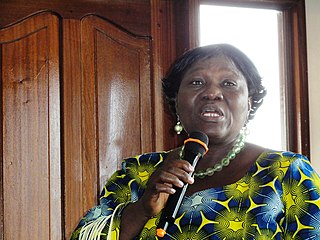The United Nations coordinated an International Conference on Population and Development (ICPD) in Cairo, Egypt, on 5–13 September 1994. Its resulting Programme of Action is the steering document for the United Nations Population Fund (UNFPA).

Nkosazana Clarice Dlamini-Zuma, sometimes referred to by her initials NDZ, is a South African politician, medical doctor and former anti-apartheid activist. A longstanding member of the African National Congress (ANC), she currently serves as Minister in the Presidency responsible for Women, Youth and Persons with Disabilities and is the Chancellor of the University of Limpopo.
Shirin Aumeeruddy-Cziffra is a Mauritian lawyer, politician and diplomat. She is the head of the Public Bodies Appeal Tribunal (PBAT), which settles disputes of civil servants and local communities in matters related to recruitment and sanctions since 2009. She was Minister of Women’s Rights and Family Affairs from 1982 to 1983, and became the Mayor of Beau Bassin-Rose Hill in 1987. She was Ombudsman for protection of children's rights from 2004 to 2011. She was the first Muslim woman to be elected as a member of the National Assembly and in a ministerial position in mauritius.

Joyce Hilda Banda is a Malawian politician, who served as President of Malawi, from 7 April 2012 to 31 May 2014. Banda took office as President following the sudden death of President Bingu wa Mutharika. She is the founder and leader of the People's Party, created in 2011. An educator and grassroots women's rights activist, she was the Minister of Foreign Affairs from 2006 to 2009 and the Vice-President of Malawi from May 2009 to April 2012. She has served in various roles as a member of Parliament and as Minister of Gender and Child Welfare before she became the President of the Republic of Malawi.
The Panafrican Youth Union (PYU) is the apex body for National Youth Coordinating Bodies and Mechanism in Africa. Known formerly as the Panafrican Youth Movement (PYM), it was transformed into the PYU at the organisation's 2003 congress in Windhoek, Namibia.

Nozizwe Charlotte Madlala-Routledge is a South African politician who was South Africa's Deputy Minister of Defence from 1999 to April 2004 and Deputy Minister of Health from April 2004 to August 2007. President Thabo Mbeki dismissed her from the Cabinet on 8 August 2007, after which she maintained her role as a member of parliament representing the African National Congress. On 25 September 2008, she became Deputy Speaker of the National Assembly, serving in that capacity until resigning from Parliament in early May 2009. She has been a member of the South African Communist Party since 1984.

The Protocol to the African Charter on Human and Peoples' Rights on the Rights of Women in Africa, better known as the Maputo Protocol, is an international human rights instrument established by the African Union that went into effect in 2005. It guarantees comprehensive rights to women including the right to take part in the political process, to social and political equality with men, improved autonomy in their reproductive health decisions, and an end to female genital mutilation. It was adopted by the African Union in Maputo, Mozambique, in 2003 in the form of a protocol to the African Charter on Human and Peoples' Rights.
Nebiha Gueddana or Nabiha Gueddana, maiden name Ben Aissa, born January 26, 1949, is a doctor and a Tunisian politician. She held several high-level positions at the national and international level.
Since the December 2010 revolution in Tunisia and protests across the Middle East and North Africa (MENA) began, Tunisian women have played an unprecedented part in the protests. Habib Bourguiba began instituting secular freedoms for women in 1956, such as access to higher education, the right to file for divorce, and certain job opportunities. Women in Tunisia enjoy certain freedoms and rights that are denied to women in neighboring countries, although the social norms have shifted since 2011.
The 17th Ordinary African Union Summit was held 28 June 2011 through 1 July 2011 in Malabo, the capital city of the Equatorial Guinea. In addition to the meeting of AU heads of state, the AU summit in Malabo included the 19th Ordinary Session of the Executive Council and the 22nd Ordinary Session of the Permanent Representatives Committee (PRC).
Nahid Toubia is a Sudanese surgeon and women's health rights activist, specializing in research into female genital mutilation.

The history of women in Morocco includes their lives from before, during, and after the arrival of Islam in the northwestern African country of Morocco.

Joséphine Ouédraogo is a Burkinabé sociologist and politician. She served as Minister of Justice of Burkina Faso from 2014 to 2016.

Natalia Kanem is a medical doctor who currently serves as the Executive Director of UNFPA, the United Nations sexual and reproductive health agency. In this capacity, she is among the highest-ranking women at the United Nations and the first Latin American to head UNFPA.

Emma Boona is a Ugandan teacher, public administrator and politician. She is the former woman representative for Mbarara District in the 8th & 9th parliaments and is a member of the National Resistance Movement (NRM), the ruling political party in Uganda.
Brigadier-General Akissi Kouamé was an Ivorian army officer. She joined the army's medical service in 1981, whilst still a medical student. Kouamé became the first woman in the army to qualify as a paratrooper and in 2012 became its first female general.

Emma Inamutila Theofelus is a Namibian politician, currently serving as a Minister of Information, Communication and Technology as of 9 February 2024. Theofelus was 23 years old at the time of her appointment in March 2020 and is the current youngest woman government minister in both Africa and Namibia.

Nazley Khan Sharif is a South African politician serving as the Shadow Minister of Women, Youth and Persons with Disabilities since April 2023, having previously served as Deputy Minister between June 2019 and April 2023. Sharif was elected to the National Assembly in the May 2019 general election. Khan is a member of the Democratic Alliance.










